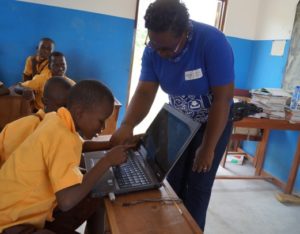Isn’t it time for Ghana to introduce programming at basic education?
 Despite the country’s progress in improving its technological advancements, there are still challenges that prevent thousands of students from fully getting access to facilities needed to learn Information and Communication Technology (ICT).
Despite the country’s progress in improving its technological advancements, there are still challenges that prevent thousands of students from fully getting access to facilities needed to learn Information and Communication Technology (ICT).
As introduced in our primary education, ICT has served as the first ladder to making students and citizens more adaptable to the growing rate of technology. The deployment of ICT and its tools have contributed to effective learning by expanding, promoting, managing assets of institutions, and improving the quality of education received in schools.
In the quest to enrich the educational system and level of ICT being taught in schools, introducing programming at the basic education level will enhance children’s thinking capacity and creativity as they grow.
Programming can be defined as a language that gives instructions to a computer to get something done. Just like every language, it follows a particular form of communication known as syntax to communicate with every computer. The idea for introducing programming isn’t to create a large pool of app developers but to develop students who are creative, critical thinkers and have an intelligent relationship with technology and the world wide web.
Many developed countries have implemented the K-12 Computer Science framework designed to make students comfortable with coding and basic computer science concepts. An example is England where children between the ages of 5 and 16 are taught some form of programming language. Finland for instance in 2016, introduced a course of study in computer programming that became part of the country’s core syllabus.
For beginners, the starting point wouldn’t be to introduce them to high-level languages like Java, C++, Python, etc. The idea is to ease the children into developing the necessary skills for coding like logic which has some benefits in courses like Mathematics.
Research has shown that in countries that have been able to implement basic programming languages like “Scratch” into their educational system, the coding skills developed have allowed students to develop their problem-solving skills and enhance creativity in those who learn how to code.
Benefits of introducing programming at a young age include
- Turning students into critical thinkers by enabling them to break down complex problems into smaller parts, making them easier to solve.
- Teaching students to persist when facing challenges. Perseverance is a difficult trait to instill in anyone, let alone a child or student. However, children shouldn’t to give up when they face a problem or a barrier; instead, they should be equipped to persevere. Coding teaches youngsters perseverance, teaching them that in order to solve an issue, they must keep trying numerous methods until they find the best one.
- Helping children develop their structural thinking ability. They learn how to put together a large structure from many smaller pieces. This not only helps youngsters understand computer programmes, but also helps them see the overall picture when they are assigned a task.
- Students can experiment and learn by themselves. Given an assignment, they can research and experiment with different codes until they can do the assignment, giving them a sense of satisfaction when done.
- Children who code are able to think systematically. Therefore, it is easier for them to express themselves and communicate more effectively. Furthermore, such children understand how to organize their thoughts and words, resulting in increased writing skills. As a result, they become better at socializing and establishing relationships.
If the Ghana education system can inculcate programming or aspects of basic programming knowledge from the primary school level into our students, it will help them develop their logical and structural thinking capacity, which will help them develop better in their courses and have an easy advantage when pursuing computer science or programming at an advanced level.
Is it time to do so?
By Kwabena Sefa – Intern
Copyright ©2021 by NewsBridge Africa
All rights reserved. This article or any portion thereof may not be reproduced or used in any manner whatsoever without the express written permission of the publisher except for the use of brief quotations in reviews.
